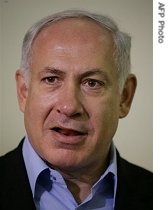2007年VOA标准英语-Israel's Netanyahu Headed for Victory in Likud
搜索关注在线英语听力室公众号:tingroom,领取免费英语资料大礼包。
(单词翻译)
By Robert BergerJerusalem
14 August 2007
Israel's main opposition1 party, the Likud, is holding an election for party leader. As Robert Berger reports from VOA's Jerusalem bureau, one of Israel's most well-known politicians is facing off with an increasingly powerful bloc2 of Jewish settlers and their supporters.
 |
| Benjamin Netanyahu, 14 Aug 2007 |
"We are beginning the campaign for the premiership and to bring a future of hope to our country," he said.
Mr. Netanyahu, a former prime minister, has soared in the polls since the inconclusive war in Lebanon a year ago, while Prime Minister Ehud Olmert's popularity has plunged4.
National elections are not due until 2010, but if Mr. Olmert's fragile government collapses5, early elections could take place next year.
Mr. Netanyahu is a hawk6 who supports existing Jewish settlements in the West Bank and opposes a Palestinian state with Jerusalem as its capital. But he wants to appeal to Israelis in the center of the political spectrum7, so he has adopted a more moderate approach. He supports peace talks and some territorial8 concessions9 on condition that the Palestinians fulfill10 their commitments to fight terrorism.
That position has put him on a collision course with Moshe Feiglin, a religious settler who is challenging Netanyahu for the party leadership. Feiglin says the Likud has lost its nationalist roots.
"We understand that Israel needs leadership that represents the values of the people of Israel, not the emptiness that the existing leadership represents," said Feiglin.
Feiglin opposes peace talks and any territorial concessions to the Palestinians, and supports expanding Jewish settlement throughout the West Bank, or what he calls the biblical Land of Israel.
While Feiglin does not expect to win, he hopes that a strong showing of perhaps 30 percent of the vote would embarrass Mr. Netanyahu and push the Likud Party further to the right.
 收听单词发音
收听单词发音 




